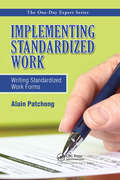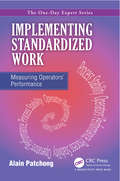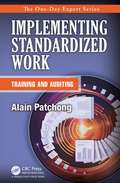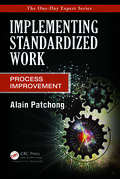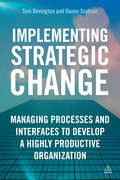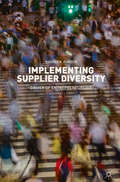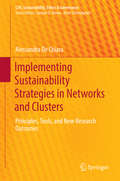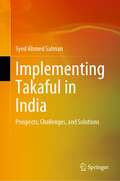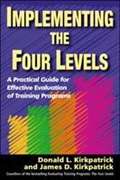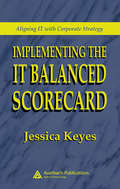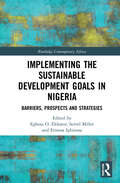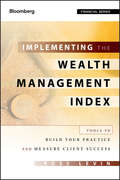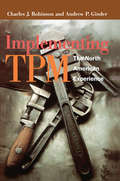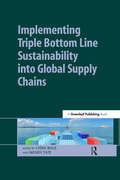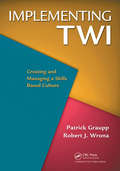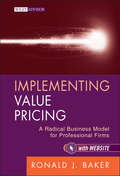- Table View
- List View
Implementing Sport Policy: Organisational Perspectives on the UK Sport System (Routledge Research in Sport Business and Management)
by Marc Keech, Iain Lindsey and John HaytonThis book critically examines the roles and contributions of different organisations in the implementation of sport policy in the UK, and therefore provides an important guide to the complexities of implementing sport policy and of achieving policy goals through, and for, sport. Presenting analytical chapters by leading sport researchers alongside shorter commentaries by practitioners working in the field, the book outlines the uneven path between policy planning and real-world outcomes. Adopting a multi-level analysis, it examines the interlocking structures and challenges of organisations from grassroots voluntary sport to national governing bodies and professional clubs, and considers the most important issues affecting UK sport policy today. This is fascinating reading for any student, researcher or practitioner working in sport policy, sport for development, sport management, sport coaching, physical education, and related areas of policy such as public health, community development, social policy, public policy and education.
Implementing Standardized Work: Writing Standardized Work Forms
by Alain PatchongThe first book in The One-Day Expert series detailed the initial steps that Thomas, a young, high-potential plant manager in an industrial group, took to assess his plant‘s situation through measurement of operators performance. The second book in the series, Implementing Standardized Work: Writing Standardized Work Forms focuses on the next step
Implementing Standardized Work: Measuring Operators Performance
by Alain PatchongThis book, the first in The One-Day Expert series dedicated to Standardized Work, is about operator performance measurement. Implementing Standardized Work: Measuring Operators Performance explains how to measure the performance of operators quickly and simply without sacrificing accuracy.Detailing how to identify the most efficient operators and
Implementing Standardized Work: Training and Auditing
by Alain PatchongStandardized Work refers to the process of finding and applying the best operational methods that will lead to cost reduction, better product quality, and increased operator safety. This book, the latest in a series dedicated to Standardized Work, focuses on operator training and auditing. It describes the methods and tools used to train operators
Implementing Standardized Work: Process Improvement
by Alain PatchongThis book, the third in a series dedicated to Standardized Work, focuses on process improvement. Implementing Standardized Work: Process Improvement begins by explaining why standardization and process improvement are two sides of the same coin both needing each other to achieve true sustainability.Describing how to use Standardized Work forms to i
Implementing Strategic Change
by Tom Bevington Daniel SamsonOne of the key success factors for any organization is effective strategic change - to ensure adaptability and increase productivity. Despite its importance, most change management projects fail or only partly deliver on their promise. the missing link often being the conflict between boardroom strategic initiatives and the working process design of the company. Implementing Strategic Change shows that most of this conflict occurs during interfacing activity - the seemly small activities that help drive a process forward and can make up to 80% of many employees workload. Examples of interfacing activities include tasks like chasing, following up, seeking permission to proceed. Implementing Strategic Change will show that business strategy and change implementation rely on deep and close process knowledge and help develop the framework for understanding and improving these activities in any organization.
Implementing Strategic Change
by Charles A. O'Reilly Michael L. TushmanWinning through innovation involves leading change. This chapter focuses on the role of managers and their teams in implementing organizational change associated with innovation streams.
Implementing Strategic Change: Managing Processes and Interfaces to Develop a Highly Productive Organization
by Daniel Samson Tom BevingtonOne of the key success factors for any organization is effective strategic change - to ensure adaptability and increase productivity. Despite its importance, most change management projects fail or only partly deliver on their promise, the missing link often being the conflict between boardroom strategic initiatives and the working process design of the company. Implementing Strategic Change shows that most of this conflict occurs during interfacing activity - the seemly small activities such as chasing, following up and seeking permission to proceed that help drive a process forward can make up to 80% of many employees workload. This book will show that business strategy and change implementation rely on deep and close process knowledge and help develop the framework for understanding and improving these activities in any organization.
Implementing Supplier Diversity: Driver of Entrepreneurship
by Kathey K. PorterThis book provides an in-depth view of supplier diversity programs and how they have contributed to the meteoric rise of minority businesses. Incorporating expert advice from supplier diversity practitioners as well as empirical data, it looks at the emergence of supplier diversity programs, how to make them effective, and their future. Supplier diversity ensures an open and inclusive competition for contracts during the procurement process, and the use of vendors of different backgrounds fosters a better understanding of a diverse customer base. Over the last decade the number of minority-owned firms in the US has increased 38 per cent. As the number of minority entrepreneurs continues to rise, these business owners have recognized the need for B2B opportunities, and supplier diversity programs that create the fastest path to scale and grow a small business. Porter highlights the history and impact of these programs as sources of business education as well as pipeline development for minority and women entrepreneurs. Finally, readers interested in levelling the playing field in business have a go-to source.
Implementing Sustainability in Higher Education: Learning in an age of transformation (Routledge Studies in Sustainable Development)
by Matthias BarthIn a time of unprecedented transformation as society seeks to build a more sustainable future, education plays an increasingly central role in training key agents of change. This book asks how we can equip students and scholars with the capabilities to promote sustainability and how the higher education curriculum can be changed to facilitate the paradigm shift needed. Across the globe, a rising number of higher education institutions and academics are responding to these questions by transforming their own teaching and learning and their institutions’ curricula. This book contributes to that development by examining in-depth case studies of innovative approaches and curriculum changes at multiple levels of the education sector. Elaborating key principles of higher education for sustainable development and identifying drivers and barriers to implementing sustainability in the curriculum, the book provides a comprehensive overview of what makes higher education for sustainable development a unique field of research and practice, as well as offering a coherent narrative of how change can be effected in it. This much-needed book is a valuable resource to inform, guide and inspire students, academics, administrators and community partners, whether experienced or new to the field, whether already committed or not to higher education for sustainable development in an age of transformation.
Implementing Sustainability Strategies in Networks and Clusters
by Alessandra De ChiaraThis book investigates the dynamics of the management of sustainability in networks and clusters - an area of increasing importance that is neglected by the many studies addressing sustainability at the single-enterprise level. The focus is in particular on projects involving groups of enterprises with a high level of productive interdependence and steady relations that allow sharing of resources and activities. The book is organized into two parts, the first of which discusses the value of the territory for firm competitiveness, examines the importance of social capital in creating sustainable business behaviors and "unique" networks, and describes principles and tools for the implementation and management of sustainability strategies in networks or clusters. The second part then presents the methodology and outcomes of empirical research conducted on industrial districts and productive centres in Campania, southern Italy, which are representative of Italian productive chains. The book will be of value to all management scholars with an interest in this field, as well as to readers wishing to learn more of the role of local institutions.
Implementing Sustainable Cities (Routledge Studies in Sustainable Development)
by Sylvie AlbertThis edited volume brings together international authors to explore how cities around the world are implementing their commitment towards the UN Sustainable Development Goals (SDGs).To achieve sustainability, cities choose their own goals and develop the necessary governance and resourcing mechanisms to achieve their objectives. This book highlights the innovative ways cities can plan their implementation by drawing on comprehensive research and literature reviews. Case studies from around the world, including North and South America, Europe, Asia, and Africa, describe examples of various cities’ governance mechanisms, resourcing strategies, and implementation strategies. By showcasing these case studies, cities worldwide can emulate, transform, and execute their own vision drawing on the examples and pathways laid out by their peers. The book concludes with a comparative analysis of UN SDG implementation, contrasting the approaches and enabling communities worldwide to learn from one another and choose strategies that meet their local needs.This book will be of great interest to students, researchers, and professionals of urban sustainability, planning, smart cities, and sustainable communities. It will also be useful for city and government stakeholders including policy makers, economic development corporations, and non-governmental organizations (NGOs).
Implementing Takaful in India: Prospects, Challenges, and Solutions
by Syed Ahmed SalmanThis book encourages insurance companies and regulators to explore offering Islamic insurance to boost the insurance industry in India. The distinctive features of Takaful also make it appealing even to non-Muslims. According to the 2012 World Takaful Report, India has immense potential for Takaful is based on the size of its Muslim population and the growth of its economy. However, it is surprising that Takaful has yet to be introduced in India since it has been offered in non-majority Muslim countries, such as Singapore, Thailand, and Sri Lanka. When the concept and practice of Takaful are examined, it is free from interest, uncertainty, and gambling. These are the main elements prohibited in Islam. However, it has been evidenced that these elements are also banned in teaching other religions believed by the Indians. Given this landscape, this book fills the gap in research on the viability of Takaful in India, focusing on its empirical aspects by examining the perception of Indian insurance operators toward Takaful.
Implementing the Four Levels: A Practical Guide for Effective Evaluation of Training Programs
by Donald L. Kirkpatrick James D. KirkpatrickAs a companion to Evaluating Training Programs: The Four Levels, 3rd ed., this guide describes different approaches to measuring trainee reaction, knowledge acquisition, behavior change, and the ultimate results of business training programs. The final chapter offers advice on building a chain of evidence that demonstrates the value of learning to the bottom line. Annotation ©2008 Book News, Inc., Portland, OR (booknews.com)
Implementing the IT Balanced Scorecard: Aligning IT with Corporate Strategy
by Jessica KeyesThe goals of an IT balanced scorecard include the alignment of IT plans with business objectives, the establishment of measures of IT effectiveness, the directing of employee efforts toward IT objectives, the improved performance of technology, and the achievement of balanced results across stakeholder groups. CIOs, CTOs, and other technical manage
Implementing the Model: Taking a New Business Model into Action
by Mark W. JohnsonA great business model blueprint is a powerful first step in seizing your white space-the range of potential activities not defined or addressed by your company's current business model; in other words, the opportunities outside the company's core and beyond its adjacencies that require a different business model to exploit. But making the leap from the theoretical blueprint to the working business doesn't happen all at once. In this chapter, company transformation expert Mark Johnson shows how companies can implement the new business models they create. He explores the three stages of implementation-incubation, acceleration, and transition-using examples from Southwest Airlines and Zara to richly illustrate the process in action. This chapter was originally published as Chapter 7 of "Seizing the White Space: Business Model Innovation for Growth and Renewal."
Implementing the Nissan Renewal Plan
by Michael Y. Yoshino Masako EgawaCarlos Ghosn, a former executive vice-president of Renault, became the COO of Nissan Motor Co., a troubled auto company in Japan when Renault bought 38% of the company in 1999. This case deals with how Ghosn turned the company around. Examines in considerable detail how he went about successfully energizing and mobilizing the demoralized employees after a decade of failed efforts. A rewritten version of an earlier case.
Implementing the Project Management Balanced Scorecard
by Jessica KeyesBusiness managers have long known the power of the Balanced Scorecard in executing corporate strategy. Implementing the Project Management Balanced Scorecard shows project managers how they too can use this framework to meet strategic objectives. It supplies valuable insight into the project management process as a whole and provides detailed expla
Implementing the Sustainable Development Goals in Nigeria: Barriers, Prospects and Strategies (Routledge Contemporary Africa)
by Eghosa O. Ekhator Servel Miller Etinosa IgbinosaThis book explores Nigeria’s progress towards achieving the Sustainable Development Goals, presenting key country-specific lessons, as well as providing innovative solutions and practices which are transferrable to other emerging economies. Despite all of Nigeria’s potential, and substantial oil revenues, poverty remains widespread and the country faces many challenges. The contributors to this book provide comparative historical and contemporary analysis of the main challenges for achieving progress in the SDGs, and make recommendations for the most effectives ways of developing, adopting, disseminating and scaling them. Starting with the conceptualisation and evolution of the SDGs, the book goes on to consider the goal on ending poverty, and the urgent need to combat climate change and its impacts. The book also reflects on the role of business and taxation, and the cultural and societal dimensions of the SDGs, including education, gender, and the role of the church. Overall, the book focuses on knowledge/implementation gaps and the role of collaborative partnerships and disruptive technologies in implementing the framework in general. This book will be of interest to scholars, policy makers and practitioners of sustainable development and African studies, as well as those with a particular interest in Nigeria.
Implementing the Wealth Management Index
by Ross LevinThe gold standard for measuring financial progress, updated for today's marketFrom Ross Levin, a trusted financial planner, comes Implementing the Wealth Management Index. The new edition of the book Investment Advisor called a "landmark opus," this revised and updated volume expands upon his legendary Wealth Management Index tool. A benchmark system that, through a series of questions and evaluations, enables advisors to score their performance for individual clients, the tool is used by firms around the world. In this new edition, the index looks at asset protection, disability and income protection, debt management, investment planning, and estate planning. The new edition adds more how-to information, as well as actual client examples and case studies to show how Levin's firm successfully uses the index as a daily strategy.Asks the important questions, like "Did you use all reasonable means to reduce your taxes?" and "Have you established and funded all the necessary trusts? Have you made your desired gifts for this year?Newly revised and expanded for the first time since 1997Essential guidance from a top man in the game, Implementing the Wealth Management Index is the one-stop resource for measuring client financial progress.
Implementing Time-Driven ABC Models: Launching a Project
by Robert S. Kaplan Steven R. AndersonBuilding a Time-Driven ABC model involves a sequence of well-defined steps. This chapter addresses the four phases of implementation, from preparation to rollout.
Implementing TPM: The North American Experience
by Alan Robinson Andrew Ginder Charles J. RobinsonThis book provides an understanding of the complexity and comprehensiveness of the total productive maintenance (TPM) process. It supplements works by Japanese authors with guidance and detail on how the TPM process relates to North American plants or facilities.
Implementing Triple Bottom Line Sustainability into Global Supply Chains
by Lydia Bals Wendy TateThe global sustainability challenge is urgent, tremendous and increasing. From an ecological perspective, the current worldwide resource footprint requires approximately 1.5 planets to sustain existing life, and with current usage would require two planets by 2030. The social impact of ever-growing resource use disproportionately affects the world’s poor – the 3 billion people living on less than $2.50 a day, as they struggle to acquire what is needed to survive. The serious ecological and social challenges we face in trying to establish global sustainable supply chains must not be underestimated, yet so far research has largely ignored the social dimension in favour of the environmental and economic. So how can we develop business strategies that move away from a primary economic focus and give equal weight to people, planet and profit? How can we create sustainable supply chains that take a true triple-bottom-line approach?Implementing Triple Bottom Line Sustainability into Global Supply Chains features innovative research, highlighting new cases, approaches and concepts in how to successfully implement sustainability – covering economic, ecological and social dimensions – into global supply chains. The four parts cover the rationale for sustainable global supply chains, key enablers, case studies showing clear implementation steps, and directions for future research and development.This book is a must-read for any academic researching in sustainable supply chain management, procurement or business strategy, and for business leaders seeking cases that will inform a critical step forward for CSR programmes.
Implementing TWI: Creating and Managing a Skills-Based Culture
by Patrick Graupp Robert J. WronaFeaturing strategies employed in Lean, this volume describes the experiences of organizations using TWI more than 60 years after the Training Within Industry program turned the U.S. into the industrial giant that won World War II. Based on their experience implementing TWI in organizations as diverse as Virginia Mason Medical Center and Donnelly Ma
Implementing Value Pricing
by Ronald J. BakerPraise for Implementing Value Pricing: A Radical Business Model for Professional Firms "Ron Baker is the most prolific and best writer when it comes to pricing services. This is a must-read for executives and partners in small to large firms. Ron provides the basics, the advanced ideas, the workbooks, the case studies-everything. This is a must-have and a terrific book. " -Reed K. Holden, founder and CEO, Holden Advisors, Corp. , Associate Professor, Columbia University www. holdenadvisors. com "We've known through Ron Baker's earlier books that he's not just an extraordinary thinker and truly brilliant writer-he's a mover and a shaker on a mission. This is the End of Time! Brilliant. " -Paul Dunn, Chairman, B1G1 www. b1g1. com "Implementing Value Pricing is a powerful blend of theory, strategy, and tactics. Ron Baker's most recent offering is ambitious in scope, exploring topics that include economic theory, customer orientation, value identification, service positioning, and pricing strategy. He weaves all of them together seamlessly, and includes numerous examples to illustrate his primary points. I have applied the knowledge I've gained from his body of work, and the benefits to me-and to my customers-have been immediate, significant, and ongoing. " -Brent Uren, Principal, Valuation & Business Modeling, Ernst & Young www. ey. com "Ron Baker is a revolutionary. He is on a radical crusade to align the interests of service providers with those of their customers by having lawyers, accountants, and consultants charge based on the value they provide, rather than the effort it takes. Implementing Value Pricing is a manifesto that establishes a clear case for the revolution. It provides detailed guidance that includes not only strategies and tactics, but key predictive indicators for success. It is richly illustrated by the successes of firms that have embraced value-based pricing to make their services not only more cost-effective for their customers, but more profitable as well. The hallmark of a manifesto is an unyielding sense of purpose and a call to action. Let the revolution begin. " -Robert G. Cross, Chairman and CEO, Revenue Analytics, Inc. Author, Revenue Management: Hard-Core Tactics for Market Domination www. revenueanalytics. com

